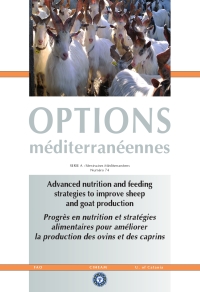| Article précédent | p. 291-297 | Article suivant |
Effect of recombinant bovine somatotropin administration on milk production, composition and some hemato-biochemical parameters of lactating goats
The objectives of the present study were to evaluate the effects of recombinant bovine somatotropin (rbST) on milk production, composition and some hemato-biochemical characteristics in Damascus goats. Fifteen Damascus lactating goats in their third to fourth lactation season and at 30-40 days postpartum were divided into three equal groups. The first group was served as control, while the second and third groups were injected, once every week for 8 weeks, with low (50 mg/doe) or high (100 mg/doe) doses of rbST, respectively. Supplementation with rbST resulted in a significant (P<0.05) increase in total milk yield by 24.3 and 22.5 % for 50 mg or 100 mg of rbST, respectively compared with control. Body weight and dry matter intake of does were not affected significantly by rbST treatment. While average daily gain (ADG) of kids that were suckling rbST-treated does was higher (11 and 10.5 % for low and high doses of rbST, respectively) than for kids of control does during the treatment period. Supplementation with rbST caused insignificant (P>0.05) increase in the levels of total solids, milk protein and fat as compared with control, while lactose significantly (P<0.05) increased. On the other hand, ash, haematological parameters, plasma proteins and the activities of plasma aspartate aminotransferase (AST), alanine aminotransferase (ALT), glutathione S-transferase (GST), alkaline phosphatase (AlP), acid phosphatase (AcP), and the levels of thiobarbituric acid-reactive substances (TBARS) and cholesterol were not affected by treatment. The results of the present study suggest that rbST is efficacious in increasing milk yield and kid growth up to 50 mg/14 d without adverse effects on lactating goats.
Les objectifs de la présente étude étaient d'évaluer les effets de la somatotropine bovine recombinante (rbST) sur la production et la composition du lait, et sur certains paramètres hémato-biochimiques de chèvres de race Damascus. Quinze chèvre Damascus allaitantes dans leur troisième ou quatrième saison de lactation et à 30-40 jours postpartum ont été divisées en trois groupes égaux. Le premier groupe servait de témoin, tandis que les deuxième et troisième groupes subissaient l'injection, une fois par semaine pendant 8 semaines, de doses faibles (50 mg/chèvre) ou élevées (100 mg/chèvre) de rbST, respectivement. La supplémentation avec rbST a donné une augmentation significative (P<0,05) de la production totale de lait de 24,3 et 22,5 % pour 50 mg ou 100 mg de rbST, respectivement par rapport au témoin. Le poids corporel et l'ingestion de matière sèche des chèvres n'étaient pas significativement influencés par le traitement de rbST. Le GMQ des chevreaux allaités par les mères traitées au rbST était plus élevé (11 et 10,5 % pour les doses faibles et élevées de rbST, respectivement) par rapport aux chevreaux des chèvres témoin pendant la période de traitement. La supplémentation avec rbST a entraîné une augmentation non significative (P>0,05) des niveaux de solides totaux, de protéines du lait et de matières grasses en comparaison avec le témoin, tandis que le lactose a augmenté significativement (P<0,05). D'autre part, les cendres, les paramètres hématologiques, les protéines du plasma et les activités de l'aspartate aminotransférase du plasma (AST), alanine aminotransférase (ALT), glutathione S-transférase (GST), alkaline phosphatase (AlP), phosphatase acide (AcP), et les niveaux de substances thiobarbituriques acido-réactives (TBARS) et de cholestérol n'étaient pas influencés par le traitement. Les résultats de la présente étude suggèrent que le rbST est efficace pour faire augmenter la production laitière et la croissance des agneaux jusqu'à 50 mg/14 j sans effets adverses sur les chèvres allaitantes.
- [ Afficher ]
- [ Télécharger ]
- [ Exporter la citation ]
Vous pouvez télécharger la citation au format :
- [ Imprimer ]
-
Mots-clés
CHEVRE, COMPOSITION CHIMIQUE, EXPERIMENTATION, LAIT, PRODUCTION LAITIERE, SOMATOTROPINECiter cet article
Sallam S.M.A., Nasser M.E.A., Yousef M.I. Effect of recombinant bovine somatotropin administration on milk production, composition and some hemato-biochemical parameters of lactating goats. In : Priolo A. (ed.), Biondi L. (ed.), Ben Salem H. (ed.), Morand-Fehr P. (ed.). Advanced nutrition and feeding strategies to improve sheep and goat . Zaragoza : CIHEAM, 2007. p. 291-297. (Options Méditerranéennes : Série A. Séminaires Méditerranéens; n. 74). 11. Seminar of the FAO-CIHEAM Sub-Network on Sheep and Goat Nutrition, 2005/09/08-10, Catania (Italy). http://om.ciheam.org/om/pdf/a74/00800394.pdf



